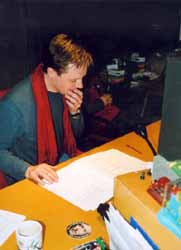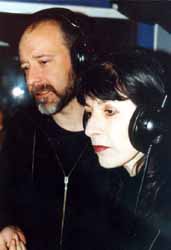As a member of the fan group Audio Visuals in the mid-Eighties,
John Ainsworth was one of the pioneers of Doctor Who
on audio. Since then he has directed his own stage play, worked
as a writer and editor in magazine publishing and is the editor
of the UK Sci-Fi Channel website. For Big Finish Productions
he produced the popular Doctor Who Unbound mini-series
and is producer and often director of the 2000 AD audio
dramas. Darren Rea caught up with him as the latest Judge
Dredd audio drama, Pre-emptive Revenge, was due to
be released...
Darren
Rea: How did you originally get involved in this industry?
John
Ainsworth: Well, outside of Radio 4, audio drama is such a
narrow field that I'd hardly describe it as an 'industry'.
Back
in the Eighties I was part of a Doctor Who fan group
known as Audio Visuals. Unlike most fan groups then, instead
of publishing a fanzine we produced our own Doctor Who
audio plays which we released on cassette. The whole thing
was run by Bill Baggs who is just incredible when it comes
to getting things done in that, unlike most of us, he doesn't
waste any time and he really does get it done! Nick Briggs
played the Doctor and also did a lot of the writing, directing
and post-production. Gary Russell took over as Producer from
Bill Baggs for the final season of plays.
 |
|
John
Ainsworth during a recording session
|
Audio
Visuals released over twenty full-length Doctor Who
audio plays over a period of about five years. By the end
the quality was extremely high in all respects - acting, writing
and post-production. So, Audio Visuals was my first introduction
to audio drama - all for love and no money. Little did I know
that I would be directing 'real' Doctor Who years later
- and getting paid for it!
DR:
How did you get introduced to the Big Finish Audios?
JA:
My introduction to Big Finish was really an extension of the
success of the Audio Visuals Doctor Who plays. We'd
got really good at it and really wanted to move in to doing
it professionally. However, at the time, we didn't really
have the business know-how. So, a few years went by in which
time the technology changed and improved and it became more
viable to create broadcast quality audio without spending
a fortune.
Jason
Haigh-Ellery came along, who is very much a business man and
knew how it all worked. He was also a fan of the Audio Visuals
Doctor Who plays (and even acted in one) so he knew what
Gary, Nick and I were all capable of. So, Jason's company,
Big Finish employed Gary and Nick to produced the Professor
Bernice Summerfield audio dramas which were a spin-off
from the Virgin Books series of adventures that were spun-off
themselves from their Doctor Who range of novels.
Gary
and Nick were keen for me to be involved but it became clear
early on that Gary and I had a difference of opinion on various
aspects of the production and I could see that this would
only lead to a fractious relationship. So, I decided that
I'd rather remain on good terms with Gary and bowed of the
project after only a couple of initial meetings. Happily Gary
and I remain good friend to this day!
Some
time later, after Big Finish had acquired the licence to produce
Doctor Who and had released quite a few of the plays,
Gary and Jason asked me to be editor of the Big Finish website
as the previous editor was stepping down. I already had some
experience of web editing and design (being editor of the
UK Sci·Fi Channel's website).
Then,
in 2000, I produced and directed my first stage play, Deceptions,
which starred Jacqueline Pearce of Blake's 7 fame.
Jason, Gary and Nick came to see the play and were impressed
with it. As a result I was offered a Bernice
Summerfield
play - The
Plague Herds of Excelis
to direct. That in turn lead to more directing and producing
for Big Finish, including the 2000 AD audio series.
DR:
Where you originally a fan of 2000 AD? Did you know
a lot about MegaCity One and Dredd? Or has this series been
a learning curve for you?
JA:
I was a casual fan of 2000 AD and Judge Dredd.
I'd bought it off an on over the years. So, I had a reasonable
feel for it but didn't know the details. With hindsight, I
think this was a good thing as knowing the subject matter
on an intimate level might have limited my ambition with the
audio series.
DR:
Had you heard the Dirk Maggs Dredd audio series produced for
the BBC? And knowing how critically acclaimed it was did that
worry you that your work would constantly be compared to those
audios?
 |
|
Toby
Longworth and Caroline Burns Cooke during the recording
of Judge Dredd: War Crimes
|
JA:
I was certainly aware of the Dirk Maggs Dredd audios but I
hadn't heard them (and still haven't I'm afraid). I'm sure
they are excellent as I like all of Dirk Maggs' productions.
To be honest, I had no knowledge of how the Dirk Maggs' versions
were regarded by Dredd enthusiasts and it never really entered
my head that our productions might be compared to them. We
just did what we thought was right and set out to produced
the best plays that we could and made every effort to capture
the essence of the comic strips.
DR:
How much artist licence do you have with the series? Do you
have to get much approval from Rebellion before you use certain
characters and plot lines etc?
JA:
Every story idea and script has to be approved by Alan Barnes
at Rebellion. Having said that, Alan is very open to ideas
and many of the story concepts, particularly the later ones,
have been developed in conjunction with him. There are a few
no-go areas (such as using Psi-Judge Anderson and Mega-City
Two) but, for the most part, we have a fairly free hand in
what we can do.
DR:
There is a strong mix of comedy and drama in these productions.
Do you think that is an integral part of its success - the
fact that the reader never knows what to expect?
JA:
I think any on-going series needs to have a certain amount
of variety in its storytelling to keep it fresh. I've certainly
made a conscious effort to have a mix of light-hearted and
more serious stories and I think it's great that Judge
Dredd is flexible enough to accommodate extremes of both.
Both types (from I
Love Judge Dredd
to War
Crimes)
seem to have been well received, so I think we've got the
mix more-or-less right.
DR:
If an audio production was to be made of your life, who would
play you and why?
JA:
Goodness, what a question! I don't know... Brad Pitt or Rob
Lowe - we're about the same age!!
DR:
What's the one piece of work that you've done throughout your
career that you are most proud of? And what's the project
that you cringe every time you think about?
JA:
I suppose the stage play I directed, Deceptions, is
a highlight of my 'career' to date. In all respects I don't
think it could have been better. I think it was a job well
done.
In
terms of audio though, it's difficult to choose. Audio production
is such a team effort that I don't always feel comfortable
taking the credit, even when I'm the director. The Judge
Dredd play War Crimes is a good example of that.
Of course, I'm very happy with the work that I and the actors
did but it's Simon Robinson - the sound-editor and musician
- who I think deserves the real praise for making it a great
production.
I think the only productions that I've been involved in that
make me cringe are some of the early Audio Visuals Doctor
Who plays that I acted in. If it was up to me I would
burn every copy of 'Shadow World' and erase it from history.
DR:
If you weren't in this industry what would you be doing?
JA:
I think I would like to be a Postman.
DR:
What are you working on at the moment?
JA:
At the moment I'm giving feedback on the post-production of
the Judge Dredd audios Pre-emptive Revenge and
Grud is Dead. I'm also having early talks about developing
a second series of Sarah
Jane Smith, a Doctor Who spin-off. On
top of all that I'm preparing to cast and record the first
of a new series of audio dramas called Space: 1889
which are being produced and released by my own production
company, Noise
Monster Productions Ltd.
DR:
Thank you for your time.
Return
to...

|